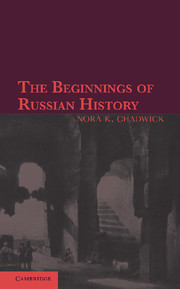Book contents
- Frontmatter
- Dedication
- Epigraph
- Contents
- Preface
- Chapter I The Early Records
- Chapter II The Early History of Kiev
- Chapter III Greek and Oriental Evidence
- Chapter IV Vladimir I
- Chapter V The Treaties with the Greeks, and Russian Heathenism
- Chapter VI Yaroslav the Wise
- Chapter VII Voevoda and Kormilets
- Chapter VIII Vladimir Monomakh
- Appendix I Extract from Ibn Miskawaih, in The Eclipse of the 'Abbasid Caliphate, Vol. v. Translated from the Arabic by D. S. Margoliouth
- Appendix II The Scandinavian Background: Oddr Víth-förli (Örvar-Oddr)
- Index
Chapter IV - Vladimir I
Published online by Cambridge University Press: 05 June 2016
- Frontmatter
- Dedication
- Epigraph
- Contents
- Preface
- Chapter I The Early Records
- Chapter II The Early History of Kiev
- Chapter III Greek and Oriental Evidence
- Chapter IV Vladimir I
- Chapter V The Treaties with the Greeks, and Russian Heathenism
- Chapter VI Yaroslav the Wise
- Chapter VII Voevoda and Kormilets
- Chapter VIII Vladimir Monomakh
- Appendix I Extract from Ibn Miskawaih, in The Eclipse of the 'Abbasid Caliphate, Vol. v. Translated from the Arabic by D. S. Margoliouth
- Appendix II The Scandinavian Background: Oddr Víth-förli (Örvar-Oddr)
- Index
Summary
When we compare the account of the reign of Vladimir I with that of his predecessors, we are struck at once by the scarcity of personal reminiscences of a heroic character, and of incidents which suggest the existence of the background of heroic poetry, whether narrative or panegyric. It has sometimes been suggested that such poetry may have given rise to certain anecdotes contained in the Povêst, which appear to be based on oral tradition. We may refer to the story (s.a. 6500, A.D. 992) which relates to a single combat between a youth of Kiev and a Pecheneg champion. The story tells how the Pechenegs sent a message to Vladimir to challenge a hero of his court to encounter one of their champions in single combat. None of the heroes of his court dared to undertake the exploit till at last an old man came forward and offered his young son, who, though of no great size, is said to have possessed extraordinary strength. The Pecheneg champion was of gigantic stature, but the youth encountered and overcame him in open combat between the two armies.
The motif is a common one in folk tales, but it also bears a close resemblance to an episode in the Icelandic saga of Bjorn Hítdoelakappi, which is said to have taken place during Bjorn's sojourn in Russia at the court of Valdimarr (i.e. Vladimir I). The story relates how Björn challenged and overcame a certain Kaldimarr, a near relative of Valdimarr himself. The story as related in the Povêst bears all the marks of oral tradition.
A somewhat more sophisticated story, which is also in all probability based on oral tradition, relates how on one occasion, as the boyars were feasting with the prince, they began to grumble because they had to eat their food with wooden spoons, whereupon Vladimir supplied them with spoons of silver, remarking that with such a druzhina he could win plenty of such wealth, but he could not with wealth obtain such another druzhina. From this and other anecdotes in the Povêst we can be in no doubt that popular stories were current in later times relating to the period of Vladimir I.
- Type
- Chapter
- Information
- The Beginnings of Russian HistoryAn Enquiry into Sources, pp. 65 - 75Publisher: Cambridge University PressPrint publication year: 2013

